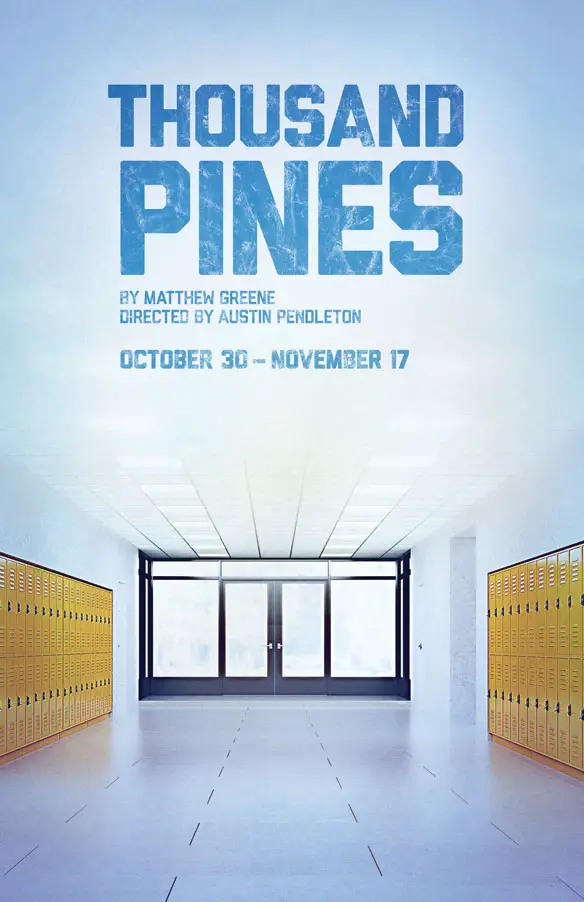
Mark Lamos is in his ninth year as artistic director of the Westport Country Playhouse, and he is coming off one of his most well-received productions: a spirited revival of the Broadway musical classic “Man of La Mancha.”
“The audience reaction was overwhelming,” he said. “In the nine years that I”™ve been here, this is the most extraordinary audience reaction I”™ve witnessed. I just can”™t get over it. The end of the first act, they started cheering. And the same thing happened at the end of the play. The audience starts to cheer before the lights go out. I”™ve never seen anything like it in my life.”
However, Lamos is not following up his “Man of La Mancha” success with another beloved musical, but with a world premiere of a drama that plumbs one of the most troubling issues to plague modern society: the proliferation of school shootings. But in presenting Matthew Greene”™s “Thousand Pines,” Lamos stated he was “very concerned” that some people might turn away from the production under the belief that it would be a diatribe on the contentious gun control issue.
“It isn”™t about gun control,” Lamos said. “It is about people who are dealing with the aftermath of loss and continuing emotional emptiness. And it”™s about American families, to a certain extent, and the inability of one generation to understand another.”
Sharing Lamos”™ concern is the play”™s director, Tony-nominated Broadway veteran Austin Pendleton, who is returning to the Westport Country Playhouse for the first time since directing E.G. Marshall in the 1992 comedy “Park Your Car in Harvard Yard.”
“This play is not addressing the gun control issue,” Pendleton said. “The issue is so urgent that we did not want to put on a preachy play. If you want to make a political statement, you should write an editorial.”
 Pendleton became aware of “Thousand Pines” two years ago. “My agent read it and said, ”˜You really should read this,”™ ” he continued. “I read it and I was very impressed.”
Pendleton became aware of “Thousand Pines” two years ago. “My agent read it and said, ”˜You really should read this,”™ ” he continued. “I read it and I was very impressed.”
Lamos became intrigued with the commercial potential of “Thousand Pines” last year when it was presented as a reading within the theater’s New Works Circle Initiative, a program focused on developing new theatrical works. Greene”™s work takes place in the homes of three suburban families on a Thanksgiving Day in the months following a deadly school shooting at a junior high school. The play considers how each family approaches grief, healing and forgiveness during a holiday where the traditional emphasis on family togetherness is replaced with the raw dimensions of emotional catharsis.
“It”™s a very powerful experience to hear the play read,” Lamos said. “We just believed in it right from the get-go.”
For playwright Greene, having his work’s premiere at the Westport Country Playhouse rather than a New York City venue made perfect sense. “The community around Westport was deeply affected by the Sandy Hook shooting,” he said. “That was probably the biggest influence on me for writing the play. There”™s something that feels correct about doing it there.”
“Thousand Pines” will open on Oct. 30 and run through Nov. 17. Lamos noted that advance ticket sales for the production were “fine,” adding that it was “tracking as a new play that no one”™s ever heard of. The people who are core theatergoers and core ticket buyers are interested. The advance is not enormous, like ”˜Man of La Mancha,” but it”™s decent.”
To engage a further depth of community awareness for the production during its run, the Westport Country Playhouse received a $20,000 grant from Connecticut Humanities to coordinate a series of events at its Lucille Lortel White Barn Center to encourage further conversation on the issues raised in the play. Guest speakers at these events will include Greene along with Linda Rost, trauma expert and co-coordinator of the Fairfield County Trauma Recovery Network, and Sujata Gadkar-Wilcox, associate professor of legal studies at Quinnipiac University.
After “Thousand Pines,” the theater is presenting Grammy-nominated pianist and storyteller Mona Golabek”™s production of “The Pianist of Willesden Lane,” based on her mother”™s escape from Nazi-controlled Vienna in 1938. For Lamos, the programming mix from an old-school Broadway favorite to a hot-button contemporary drama to a music-infused meditation on the events leading up to the Holocaust reflects his mission on bringing the full theatrical spectrum to Fairfield County.
“My main mantra is: if I lived in Fairfield County and didn”™t have the chance to see any other theater for a year, what would be the richest variety of things I can go to?” he explained. “A musical, a drama, something that is relevant to the moment, something that is sheer entertainment, maybe a classic like Moliere or Shakespeare. Then, really it comes down to very personal response and excitement level of certain projects, or which I expect will give a lot of entertainment value or thought value to the people who see it.”






















